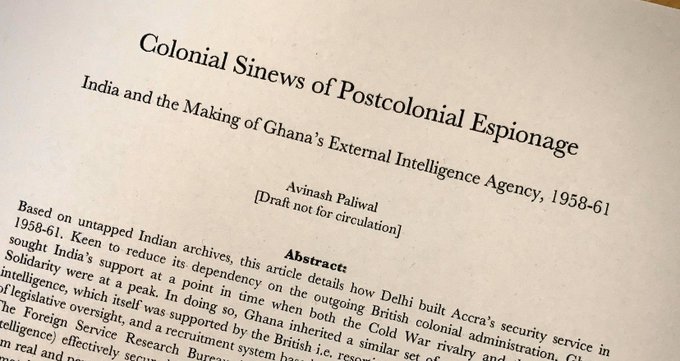
Shreyas Shende
@Shreyas_Shende1
Followers
933
Following
899
Media
245
Statuses
863
Interested in South Asian security, energy & policy issues; @UChicagoCIR & @AshokaUniv alumnus; previously @CarnegieIndia @CSISIndiaChair
D.C. / Zoom
Joined July 2021
Don't wanna be here?
Send us removal request.
Explore trending content on Musk Viewer
EP9 U STEAL MY HEART
• 305703 Tweets
Quincy Jones
• 245716 Tweets
Rubén Gisbert
• 128393 Tweets
Nekfeu
• 89399 Tweets
Iker
• 86249 Tweets
Vidal
• 83102 Tweets
Imane Khelif
• 74783 Tweets
Equatorial Guinea
• 51584 Tweets
DREAMSCAPE HIGHLIGHT MEDLEY
• 40543 Tweets
Dennis Allen
• 37773 Tweets
DHARAVI SUAR ROPIG
• 29309 Tweets
CHOKLI BLACK DAY
• 24443 Tweets
Tel Aviv
• 24001 Tweets
#الاهلي_الشرطه
• 18488 Tweets
#راكان_السهلي_وكفي
• 12846 Tweets
نيمار
• 12539 Tweets
#تجار_مخالفين_النظام
• 12089 Tweets
Last Seen Profiles
Pinned Tweet
🚨 Publication update: Happy to share I have a book chapter, co-authored w
@Rudra_81
, on the Research & Analysis Wing (R&AW) in the recently published 'Institutional Roots of India's Security Policy' edited by
@MilanV
& published by
@OxUniPress
. (1/12)
14
24
150
I recently had the privilege to organize and moderate a conversation on Indian democracy with
@pbmehta
thanks to
@UChicago
’s Committee on Southern Asian Studies,
@UChiPolitics
, and
@UChicagoLaw
.
The Committee on Southern Asian Studies
@UChicago
,
@UChiPolitics
&
@UChicagoLaw
is hosting
@pbmehta
for a discussion on Indian democracy this Thursday (23/2) at the IOP
@UChiPolitics
!
Event link:
0
4
19
5
4
82
🧵 on my interview with
@srinathraghava3
on his book 1971: A Global History of the Creation of Bangladesh for
@UChicago
's Committee on South Asian Studies [from April '22] - (1/10)
1
17
73
CIR students & staff are in Taiwan for an intensive
@UChicagoCIR
Asia Seminar!
🧵 on our visits + experience: Day 1 started with a super informative session on Taiwanese politics by
@lnachman32
@nccu1927
, followed by a visit to the American Institute in Taiwan
#CIRinTaiwan
3
3
39
Interesting conversation between
@GhoshAmitav
&
@davidwengrow
on their respective books - The Nutmeg's Curse & The Dawn of Everything
@UCL_IAS
0
12
34
My (first!) piece in
@contingent_mag
about my archival research trip
@IkeLibrary
: A Postcard from Abilene, KS
2
8
31
Challenges around becoming the ‘+1’ in a China+1 strategy: Global mfg firms in 🇮🇳 rely on 🇨🇳 workers & technicians but visa rules have been tightened since COVID & the Galwan clash. via
@ft
1/5
1
8
30
This conv. between Srinath Raghavan &
@amitvarma
- released after the Pulwama attack in 2019 - remains one of the most thoughtful and nuanced ones on the history of the India-Pak conflict.
The hidden dynamics of the India-Pakistan conflict are so crazy complicated, aren't they? The game theory, the geopolitics, the yada yada yada.
Not any more.
Listen to
@srinathraghava3
give me a masterclass in ep 111 of The Seen and the Unseen:
18
65
270
1
4
30
I reviewed 2 books (authored by
@clary_co
& Satinder Lambah respectively) on
#India
#Pakistan
for
@lawfare
. The books shed light on peace and conflict between 🇮🇳 & 🇵🇰, and as I argue in the piece, hold insights for the future of bilateral ties:
Two decades ago India and Pakistan reached a cease-fire agreement.
@Shreyas_Shende1
reviews “The Difficult Politics of Peace,” by Christopher Clary and “In Pursuit of Peace,” by Satinder Lambah which look at how the CFA was achieved & what may happen next.
0
5
7
1
7
27
From
@washingtonpost
's Afghanistan Papers: then ISI head Ashfaq Kayani to Ryan Crocker on the Pakistan & Haqqani + Quetta Shura relationship (p. 35-36)
0
4
22
The Committee on Southern Asian Studies
@UChicago
recently hosted Amb.
@ShivshankaMenon
to discuss 🇮🇳's place in a world adrift. I had the privilege to moderate this conv. & we touched upon strategic autonomy, 🇮🇳-🇨🇳 ties & intelligence reforms:
@UChiDelhi
0
5
22
Trying something new with
#Indialog
!
🧵 on curated research & reportage focused on 🇮🇳 across
#climate
#energy
#foreignpolicy
#politics
& more for my newsletter. Link in the image & bio. Subscribe for weekly updates!
1/n
2
8
26
This thread shows the amount of work it takes great outlets like
@reporters_co
to hold the govt accountable.
Read
@tapasya_umm
's report in
@Article14live
on the govt's move to make aadhar mandatory for children to access nutritious meals -
#Thread
: Barefaced Government Lies.
1. A couple of months back an official (a trusted source) told us at
@reporters_co
something incredulous.
19
340
730
0
6
20
Delighted to see
@mid_day
cover
@CarnegieIndia
's
#AnahitaSpeakerSeries
! Since 2019, the forum has hosted numerous inspiring speakers incl.
@KhabarLahariya
's Kavita Devi,
@MrinalPande1
,
@ajanthasub
,
@viswanathkv
, and more!
0
3
19
The Committee on Southern Asian Studies
@UChicago
,
@UChiPolitics
&
@UChicagoLaw
is hosting
@pbmehta
for a discussion on Indian democracy this Thursday (23/2) at the IOP
@UChiPolitics
!
Event link:
0
4
19
In March
@UChicagoCIR
students had the opportunity to interact with journalists in Taiwan who prev reported from China. All of them highlighted how coverage on 🇨🇳was becoming distant and reporting on pol. elites became much more difficult after journalists were made to leave 1/2
1
0
17
Two years after the Taliban rose to power, what is India's Afghanistan strategy?
In my latest for
@SAVoices
, I argue that there is a lot more that India can do to tend to🇮🇳🇦🇫people-to-people ties.
2
2
16
1/ What might the return of the Labour Party mean for 🇮🇳🇬🇧 ties? I analyze this qn & more in the latest edition of Indialog (link in image & bio). The last time the Party was in power, things didn't go v well.
@MohanCRaja
provides a helpful historical context:
1
7
16
The Committee on Southern Asian Studies
@UChicago
is hosting Amb.
@ShivshankaMenon
for a conversation on the various security challenges to India on 19th Feb at 8:30 pm IST/9 am CST. Registration link:
@UChiDelhi
@UChicagoNews
0
3
15
This day marks 4 years since the Galwan border clash bw 🇮🇳 & 🇨🇳 that resulted in the death of 20 🇮🇳 soldiers. To better understand the state of bilateral ties, I spoke with Amb.
@VGokhale59
, the former Foreign Secretary of 🇮🇳, for my newsletter Indialog. 1/6
1
5
14
The vol. has a solid set of chapters on agencies crucial to India's security authored by
@pstanpolitics
@RahulBhatia_11
@mehtasaurus
@jabinjacobt
@raghunid
@praveenswami
@AkshayMangla
@DrAyeshaRay
& others.
Grab a copy of the 📖 at: (12/12)
0
2
13
Fascinating lecture by
@UChicago
Prof Rochelle Terman on her latest book ‘The Geopolitics of Shaming’ at the first
@UChicagoCIR
DC trek!
@MatthiasStaisch
@sshahid_mk
0
3
12
@CNNnews18
has an explainer on India's interests in Afg that quotes a
@CarnegieIndia
paper authored by
@Rudra_81
and me: How Invested India Is In Afghanistan. What Taliban In Kabul Means For New Delhi
1
2
13
🧵 on my interview with Dr. Srinath Raghavan on his book '1971: A Global History of the Creation of Bangladesh' for
@UChicago
's Committee on South Asian Studies: (1/6)
🧵 on my interview with
@srinathraghava3
on his book 1971: A Global History of the Creation of Bangladesh for
@UChicago
's Committee on South Asian Studies [from April '22] - (1/10)
1
17
73
1
3
13
The refusal of visas for Afghan students is a real tragedy. I argue in
@SAVoices
that strong people-to-people ties are an imp. factor in🇮🇳🇦🇫 ties and while security concerns persist, there is a lot more that India can do to further support Afghan citizens:
Afghanistan embassy announces shutdown citing lack of resources since Taliban takeover, accuses MEA of withdrawing support from the embassy appointed by the previous Ghani government, refusing visas for 3,000 Afghan students. Reporting
@the_hindu
13
63
176
0
0
12
Fascinating conversation bw
@adam_tooze
&
@pbmehta
at
@CPR_India
that touches upon various responses to COVID and what it signifies, liberal politics, tech solutionism, & statistics and the state - via
@YouTube
0
3
12
Recently,
@TheEconomist
&
@business
have written about geopolitical risk, and the heads of
@WorldBank
,
@UN
, &
@jpmorgan
have warned about it. Can geopolitical risk be measured and how does it affect 🇮🇳? I have covered this & more in the 4th edition of Indialog. Link in bio.
0
2
12
Grateful to
@UChicagoCIR
for organizing the visit + to Ben Blanchard (
@Reuters
),
@WilliamYang120
&
@joyuwang
for taking the time to engage with us:
@MatthiasStaisch
@PinarAlakoc
2/2
@NPM_Taiwan
@UChicagoCIR
@Taiwan_Today
@foreignersinTW
Day 7: Discussions w/ Ben Blanchard (
@Reuters
),
@WilliamYang120
&
@joyuwang
on the challenges of reporting on China from Taiwan, on the media landscape in Taiwan, and what to make of the upcoming 2024 presidential elections
@TaiwanFCC
@UChicagoCIR
#CIRinTaiwan
7/n
1
1
5
0
0
11
India “might not have the levers to pull Russia away from China, but they want to give it as many opportunities as they can to stop them from putting all their eggs in the Chinese basket.”
@AlexGabuev
. The primary challenge remains 🇨🇳 as Amb. Saran notes.
0
3
11
🧵 on interesting/inspiring art I've come across:
Discovered Shiva Lal's depiction (from the mid-19th century) of the British opium trade thanks to
@GhoshAmitav
's 'Smoke & Ashes.' Some of his work is housed
@V_and_A
: ; (1/n)
1
5
11
Chartbook
#77
: More than 7000 deaths per day ... and we talk as though it is over:
@adam_tooze
0
1
9
India looks at reopening mission in Kabul minus senior diplomats via
@IndianExpress
: "The Indian security team that visited Kabul in Feb would have sought travel clearances from Taliban, and according to sources, met officials in the Taliban government."
0
3
10
This is similar to a recent arg. by
@ajay_shah
&
@IlaPatnaik
. Trade barriers against 🇨🇳 imports are imp but need to take place alongside an array of other measures that boost local capacity: 5/5
0
5
10
One of the key terrorism-related security challenges that
@Rudra_81
and I had written about in our (2020)
@CarnegieIndia
working paper on 'Dealing with the Taliban: India's Strategy in Afg' was the rise of ISKP following U.S. withdrawal:
0
3
9
🧵 4 key takeaways from my interview w/ Amb.
@VGokhale59
on his book 'After Tiananmen: The Rise of 🇨🇳' for my newsletter Indialog (link in bio).
(1/10)
1
4
9
An interesting feature of Taiwanese politics that
@lnachman32
pointed out was the question of identity (surveys conducted by the Election Study Center
@nccu1927
); also featured in this recent
@TheEconomist
report by
@aliceysu
:
#CIRinTaiwan
2/n
1
2
9
An Indian govt official quoted in the report (speaking anonymously): We are aware China is the world’s factory” & “It cannot be dispensed with.”
@BaldwinRE
had a piece in
@voxeu
(Jan 2024) outlining the extent of 🇨🇳’s reach in global mfg: 3/5
1
1
9
Another insightful edition of
@CarnegieIndia
's 'Ideas and Institutions' newsletter by
@suyashrai
&
@AnirudhBurman
. Interesting takeaway on what may happen when the govt.'s fiscal space reduces: -
The 7th issue of 'Ideas and Institutions' deciphers the BJP government's strategy for using
#welfare
expenditure to reach potential voters, and includes a review essay on the book Survival of the City: Living and Thriving in an Age of Isolation. 👇
0
3
9
0
1
9
Strong people-to-people ties is an important factor of the India-Afg bilateral relationship and while security concerns from the region persist, there is a lot more that India can do to further support Afghan citizens. Read:
@SAVoices
1
2
9
Is it right to say that we know more about what is happening on the India-China border (since 2020) from non-Indian officials than from Indian ones?
Chinese activity in eastern Ladakh ‘eye-opening’, behaviour ‘concerning’, says U.S. Army General ,
@dperi84
reports in
@the_hindu
1
10
23
0
0
8
.
@CarnegieIndia
's Interpreting India podcast consistently hosts really thoughtful guests and this episode with Mr. Shyam Babu is no different. Learned so much about the politics of social justice in India & what makes a 'community'.
I learnt a lot from this podcast conversation with Mr. D. Shyam Babu of
@CPR_India
on the caste census and the politics of social justice in India. His deep understanding based on many years of research and experience shines through. Please do listen:
0
15
75
0
0
8
Alongside the sheer trauma of & challenge around retaking
#exams
, what is one to make of the 🇮🇳 v 🇨🇳 debate when you’re reading
@TheEconomist
on how 🇨🇳 is a R&D juggernaut & otoh you find that the 🇮🇳 govt can’t conduct exams that determine the future of millions of students.
1
1
10
- GCCs in 🇮🇳: 700 in 2010 >> 1580 in 2023 (acc. to
@nasscom
)
-
@MercedesBenzInd
employs ~6000 ppl at its Bengaluru R&D centre (largest such op. outside 🇩🇪)
- 🇺🇸 MNCs exp. on R&D activities in 🇮🇳: $1.7 bn in 2010 >> $5.5 bn in 2021 (
@BEA_News
)
0
3
6
Insightful
@CSISIndiaChair
report on pvt sector distribution companies (discoms) in 🇮🇳: .
@RichardRossow
&
@akshatco
look at the history of electricity distribution reform & provide a roadmap for states that want to open their distribution sectors. (1/2)
1
0
7
Day 2: Conversations on key security issues plaguing Taiwan with CAPS’ Andrew Yang (previously in the Def Min) & INPR’s Yujen Kuo followed by a visit to the Chiang Kai-shek Memorial Hall
#CIRinTaiwan
1
0
7
India Last Week
#3
:
Latest Indialog edition includes -
@archchaudhary
&
@KartikiNegi
's
@carboncopyinfo
story on heat waves,
@suhasinih
on the R&AW, T. N. Ninan's
@TheIndiaForum
piece on how 🇮🇳's economy is doing well but not many Indians are & more. Link in image & bio > >
3/n
2
3
6
@UChicagoCIR
Day 8: The
@UChicagoCIR
seminar in Taiwan ended with visits to the
@INDSRTW
to discuss cross-strait security issues, the beautiful Longshan temple, &
@TFDemocracy
to learn more about the org's work and Taiwanese democracy
#CIRinTaiwan
11/n
0
2
6
In the book,
@srinathraghava3
argues that the nuclearization of the subcontinent can be traced to 1971. I asked him about other major changes that came about bc of the crisis, and he notes the shift in how 🇮🇳 &🇵🇰 chose to address their issues post-1971 (7/10) -
1
0
6
🚨Recent revelations by a senior 🇮🇳 def. official of
#India
#UnitedStates
intel ties & certain dev. in joint def. production (INDUS-X) raises interesting questions about the state of India-US bilateral ties. I cover this & more in the latest issue of Indialog. Link in bio >>
0
1
6
A few actors played a crucial role in creating the agency incl. PM Indira Gandhi, P. N. Haksar (then secretary to PM Gandhi & "arguably one of the most influential civil servants," per
@Jairam_Ramesh
), and R&AW's first chief, R. N. Kao. (4/12)
1
0
5
From the stunning ‘Art for the Millions: American Culture and Politics in the 1930s’ exhibit
@metmuseum
.
0
1
6
Detailed ground reporting on West Bengal's ambitious coal mining project and its impact on the environment & local population by
@tdeoll
in
@down2earthindia
's latest issue + protests by the local community:
0
1
6
For the latest ed. of Indialog (my weekly newsletter), I spoke w/ Amb.
@VGokhale59
about his book 'After Tiananmen: The Rise of 🇨🇳.' The conv. touched on lessons that 🇮🇳 can draw from China's rise, bilateral ties, and challenges to Chinese leadership:
0
4
6
1/7 Recently, there have been several illuminating conversations about
#Afghanistan
. Some of the ones I found helpful include:
@SteveCollNY
on the distinct phases of the 20-year war & how the Feb. 2020 agreement gave the Taliban a battlefield advantage:
We talk with Pulitzer Prize-winning journalist and author
@SteveCollNY
about what's going on in Afghanistan.
Listen:
8
23
46
1
1
6
@Rudra_81
@CarnegieIndia
Really glad I could be a part of the team that launched this great initiative! :)
0
0
6
Interesting intervention on electoral bonds by
@AnirudhBurman
. How does one balance confidentiality & transparency when it comes to electoral financing:
In Issue
#44
of Ideas and Institutions, I write about Daniel Chandler's book "Free and Equal: What Would a Fair Society Look Like?", which introduces, defends, and applies John Rawls's ideas. And
@AnirudhBurman
writes about electoral bonds. Read/subscribe:
0
0
3
0
0
6
1/ "Our FTA negotiations is the floor not the ceiling of our ambitions"
@DavidLammy
on 🇮🇳🇬🇧 trade talks. What does the return of the Labour Party mean for India-UK ties? I analyzed this and more for my newsletter Indialog. Link in image & bio.
UK foreign minister
@DavidLammy
says he'll push for reset of India-Britain ties during visit to New Delhi, including by reiterating commitment to securing FTA.
0
0
0
1
2
6
Survey results from
@GallupNews
on how Indians think about the future, standard of living, and climate change.
Inside India: World's Most Populous Nation Looks Ahead
0
2
6
Long term aid packages to Afg and assistance to the ANA can "serve as a deterrent" and, crucially, act as a morale booster: How US can exit Afghanistan and still avoid the ‘betrayal’ tag via
@ThePrintIndia
@Rudra_81
@CarnegieIndia
1
1
6
This
@BJP4India
post is another marker of the increasing interplay between domestic politics and foreign policy. Drawing on 2 recent incidents, I try to make sense of the dynamic between domestic politics & FP for the latest edition of
#Indialog
—
(1/3)
2
2
6
Read the entire interview with
@srinathraghava3
here: and pick up a copy of this seminal work!
1
0
5
🧵 on
#PakistanElection
- 🇵🇰 is heading to the polls tomorrow. In the latest edition of Indialog, I look at how 🇵🇰 elections might shape 🇮🇳-🇵🇰 ties. While ties have deteriorated over the past decade, recent shifts might augur well for the 2 states: (1/3)
1
2
5
Articles on how the developing 🇷🇺-🇨🇳 partnership can impact Russia's defense ties with India. Former FS Saran: "China now has the capacity to limit Russian engagement with India, including in defence. This must now enter our own foreign policy and security calculations." 1/4
1
0
5
Fascinating conversation on Indian democracy -
@ProfVarshney
talks about the imp of leadership, how subculture diversity helps (!) democratization in India, democratic backsliding under the current gov. & more:
🎙️Episode 104🎙️
India is perhaps the original democracy in a hard place.
@ProfVarshney
from
@WatsonInstitute
&
@SouthAsiaBrown
explains why India's democracy thrived despite such "inhospitable conditions" as well as the threats to its democracy today.
0
13
22
0
1
5
In a
@CarnegieIndia
working paper (June 2020), co-authored with
@Rudra_81
, we highlighted a set of mitigation strategies that could help India protect its interests. One of the recommendations was to reach out to certain parts of the Taliban.
@suhasinih
: Officials confirmed that "India is engaging all stakeholders in Afghanistan, including some parts of the Taliban, as part of a “multi-track” strategy necessitated by the advance of the Taliban militants"
0
0
1
1
0
5
On the new iPhone having a USB-C port, as
@_jessicamendoza
notes when it comes to tech regulation: "whatever happens in Brussels doesn't just stay in Brussels" +
@samschech
on changes Big Tech will be making because of EU's tech regulations -
IPhones w USB-C are just the latest example! Now more EU rules are coming, and big tech May have no choice but to bend.
@kimmackrael
and I have more on
@wsj
’s The Journal podcast.
2
3
10
0
0
5
@sana_r_ch
@ArmorySqPrize
@jasongrunebaum
@shreedaisy
@arunava
@pia_sawhney
@sawadhussain
Many congratulations, Sana! Excited to see how you develop the project ☺️
1
0
5
“So despite being the fifth largest economy in the world, India’s ability to fund health, education, and public services is severely constrained by low individual prosperity” -
@EmergingRoy
0
1
5
@UzairYounus
Also
@srinathraghava3
's '1971: A Global History of the Creation of Bangladesh' which places the event in the global context of the late 1960s and early 1970s (link to my interview with the author: )
🧵 on my interview with
@srinathraghava3
on his book 1971: A Global History of the Creation of Bangladesh for
@UChicago
's Committee on South Asian Studies [from April '22] - (1/10)
1
17
73
0
1
5
Great opportunity for those interested in India's policy-making space & tech policy roles!
@CarnegieIndia
@Rudra_81
@SuryaValliappan
Check out the work Carnegie's Tech & Society program does here:
0
1
5
Day 7: We also had the opportunity to visit the Tzu Chi Foundation and interact with volunteers!
@UChicagoCIR
#CIRinTaiwan
10/n
1
0
5
The NYT report is not as definitive as it is being made out to be and there are still some gaps in what intelligence agencies know -
When
#NordStream
was bombed in Sept, Russia was immediately blamed for the attack.
Five months later, Hersh reported that the US carried out the attack.
Four weeks later, NYT & WaPo quote anonymous US officials to report that some nameless Ukraine group carried out the attack.
13
38
327
0
0
5
@NPM_Taiwan
@UChicagoCIR
@Taiwan_Today
@foreignersinTW
Day 7: Discussions w/ Ben Blanchard (
@Reuters
),
@WilliamYang120
&
@joyuwang
on the challenges of reporting on China from Taiwan, on the media landscape in Taiwan, and what to make of the upcoming 2024 presidential elections
@TaiwanFCC
@UChicagoCIR
#CIRinTaiwan
7/n
1
1
5
"As much as we talk about the phrase “energy transition,” the history of energy is not one of transition — it’s one of addition" -
@JasonBordoff
What Happens When Great Power Conflict and Climate Action Collide?
@ezraklein
@OSullivanMeghan
0
1
5
Day 4: Visit to the stunning
@TaiwanNDHU
campus to learn more about Taiwanese indigenous communities
@kerim
@UChicagoCIR
#CIRinTaiwan
5/n
1
0
5
@prateekkapil
Really interesting. This
@CarnegieEndow
paper by
@CChivvis
&
@beatrix__gb
on middle powers (incl India) also shows the different approaches that states have taken while navigating geopolitical fault lines. Tough choices for India indeed -
0
3
4
By the 1980s, "the R&AW’s purview had shifted from India’s immediate land borders to include 🇱🇰,🇦🇫, & even further afield to Africa."
@PaliwalAvi
has authored one of the few texts on the institutional links between 🇮🇳 & some African spy agencies: (6/12)
1
0
2
Imp investigation on electoral bonds: "only 19 parties in India received donations through bonds" + "BJP got the largest share of the pie-67.9% or Rs 4,215.89 crore of the total electoral bonds purchased between financial years 2017-18 and 2019-20"
In 2019 the SC asked for details of Electoral Bonds from parties that got it. In sealed covers. 105 parties replied. Then SC forgot the case.
@shreegireesh
,
@poonamjourno
&
@someshjha7
dug the data out. BJP got 68% of funds. Only 16 other parties got bonds
14
296
523
1
0
4
Informative
@CarnegieIndia
piece by
@SahebSChadha
outlining 5 reasons why a strategic détente between India and China is unlikely:
🔔 New Commentary!
Contrary to recent analyses,
@SahebSChadha
explains why a strategic détente between India and China is unlikely.
Read:
0
1
8
1
1
4
From Dr. Ambedkar's 'Conditions Precedent for the Successful Working of Democracy' speech (Dec. 1952).
(p. 472-86).
#IndiaRepublicDay
0
3
4

















































































































































